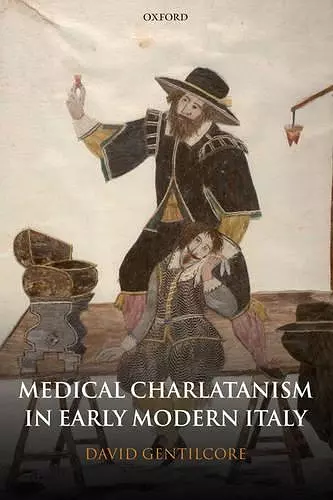Medical Charlatanism in Early Modern Italy
Format:Hardback
Publisher:Oxford University Press
Published:21st Sep '06
Currently unavailable, and unfortunately no date known when it will be back

From the mid-sixteenth century onwards, the Italian Protomedicato tribunals, Colleges of Physicians, or Health Offices (jurisdiction varied from state to state) required charlatans to submit their wares for inspection and, upon approval, pay a licence fee in order to set up a stage from which to perform and sell them. The licensing of charlatans became an administrative routine. As far as the medical magistracies were concerned, charlatans had a defineable identity, constituting a specific trade or occupation. This book studies the way charlatans were represented, by contemporaries and by historians, how they saw themselves and, most importantly, it reconstructs the place of charlatans in early modern Italy. It explores the goods and services charlatans provided, their dealings with the public and their marketing strategies. It does so from a range of perspectives: social, cultural, economic, political, geographical, biographical and, of course, medical. Charlatans are not just some curiosity on the fringes of medicine: they offered health care to an extraordinarily wide sector of the population. Moreover, from their origins in Renaissance Italy, the Italian ciarlatano was the prototype for itinerant medical practitioners throughout Europe. This book offers a different look at charlatans. It is the first to take seriously the licences issued to charlatans in the Italian states, compiling them into a 'charlatans database' of over 1,300 charlatans active throughout Italy over the course of some three centuries. In addition, it makes use of other types of archival documents, such as trial records and wills, to give the charlatans a human face, as well as a wide range of artistic and printed sources, not forgetting the output of the charlatans themselves, in the form of handbills and pamphlets.
[A reference point for anyone who wants to study any aspects of medical charlatanism in early modern Europe. * Journal of the Historical Association *
In a book destined to become a classic in the field, David Gentilcore offers a remarkably textured view of the somewhat elusive history of early modern charlatans ... A superb piece of scholarship with a nuanced blend of medical, social, and cultural history, Medical Charlatanism in Early Modern Italy will appeal to a wide range of scholars and should stand for some time as the authoritative treatment of the subject. * George McClure, Journal of the History of Medicine and Allied Sciences *
There is much to be learned from this hefty volume, the usefulness of which is greatly enhanced by one of the best indexes that I've seen in an academic work. * William Eamon, Isis *
This wonderfully informative, deeply learned, historiographically acute and wide-ranging study should be indispensable reading for all historians of early modern medicine. * Nancy Siraisi, Social History of Medicine *
Thoroughly researched and delightfully written, Gentilcore's book is a major contribution both to the history of science and medicine and to the social history of early modern Europe. * Philip Gavitt, European History Quarterly. *
a richly drawn, innovative, and fascinating study ... consistently informative, often entertaining, and that opens
- Winner of Winner of the Royal Society of Canada's Jason A. Hannah Medal 2008.
ISBN: 9780199245352
Dimensions: 240mm x 165mm x 30mm
Weight: 852g
448 pages